Confucius Institute bridges global language barrier
By YANG HAN in Seoul and PAN MENGQI in Beijing| China Daily| Updated: Sep 24, 2019
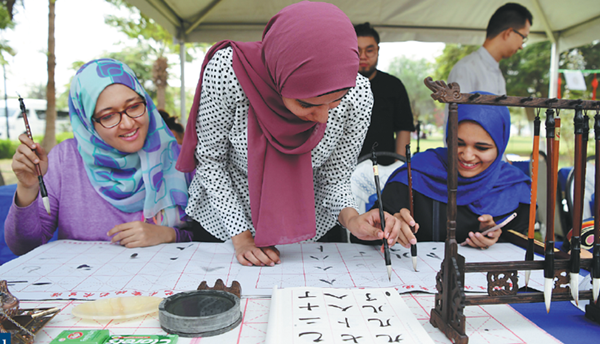
Students learn Chinese calligraphy during a cultural week in Ismailia, Eygpt, last year. [WU HUIWO/XINHUA]
Chinese culture promoted around the world
Editor's note: In "Footprint", a series of stories recalling important examples of China interacting with the rest of the world, we follow the path the country has taken in the past seven decades.
Park Kyung-na is proud of being the first person employed by the world's first Confucius Institute, a China-funded organization that promotes the country's language and culture globally.
Park vividly remembers the institute's official launch in Seoul, South Korea, in November 2004.
"The opening ceremony was full of joy and was attended by representatives from all sectors, from government officials to cultural figures," said Park, who is deputy director of the Confucius Institute in Seoul, or CIS.
"It took us almost a year to get everything ready. I was very excited about the role the Confucius Institute was going to play" in teaching the language and cultural exchanges, Park said.
"Over the past 15 years, CIS has developed in leaps and bounds, together with the rapid expansion of the whole Confucius Institutes global network," Park said. "The operation has become more systematic and we can now offer a lot more programs."
There are now 536 Confucius Institutes and 1,139 Confucius Classrooms in 157 countries, providing educational opportunities to some 11 million students.
CIS Director Lee Joon-sik said the ultimate goal is to help the people of the Republic of Korea to understand China better through language.
A fundamental mission of the institute is to popularize the Chinese language while enhancing communication between the ROK and China in education and culture, said Lee, who has led CIS since 2015.
After China and the Republic of Korea established diplomatic relations in 1992, Chinese-language education became increasingly popular in the country, leading to the formation of CIS in 2004.
With 23 in total, the ROK is now home to the most Confucius Institutes in Asia, according to the Confucius Institute Headquarters.
The Confucius Institute Headquarters said the centers are often situated at universities and schools.
A staff member from the Headquarters said: "The Confucius Institute has created a unique model of cooperation with local universities. Only when there is a need to learn Chinese somewhere and apply to us, will we build a Confucius Institute with local universities."
Although the first Confucius Institute has helped people in the ROK to learn Chinese and be-come more familiar with Chinese culture, Koreans have a long history of using Chinese characters, as the Korean alphabet was only created in the mid-15th century. Today, many secondary schools in the ROK continue to offer Chinese lessons.
Lee said: "Koreans have been interested in Chinese culture since ancient times. The older generation, in particular, is familiar with important Chinese works such as the Analects of Confucius, classic novels like Romance of the Three Kingdoms and famous poets such as Li Bai and Du Fu."
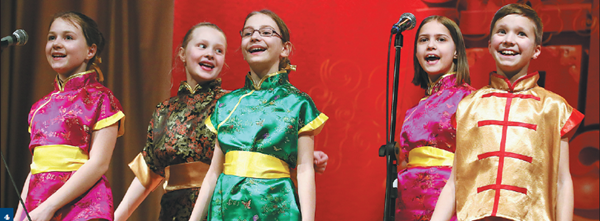
Children sing Chinese songs in Minsk, Belarus, during Lantern Festival this year. [PHOTO/XINHUA]
Recognized standard
Today, more than 500 students visit CIS each month to learn Chinese, from primary school and university students, to office workers and retirees. Most of them hope to improve their speaking skills and pass the Hanyu Shuiping Kaoshi, or HSK, the Chinese Proficiency Test, to improve their job prospects.
The HSK result is a generally recognized standard to judge the level of a student's Chinese by many schools in the ROK, Lee said. "The main reason these students learn Chinese is because they think ROK-China relations will become closer, so learning the Chinese language and culture will be conducive for their development."
However, some students are learning purely out of interest, Lee said.
The ability to speak Chinese has become an important measure of talent in many companies in the ROK. As China is the country's biggest trading partner, and a free trade agreement between the two nations was signed in 2015, many ROK enterprises, including the conglomerates Samsung, LG and SK, see passing the HSK test as a bonus for their job candidates.
Li Hong, education counselor at the Chinese embassy in the ROK, told People's Daily in May that last year, the number of students sitting the HSK in the ROK exceeded 110,000, more than any other country. Some 500 students sat the test when it was first held in the ROK in 1993.
To meet demand, CIS offers a wide range of lectures on Chinese classical literature, economy, culture, tourism and poems. It also holds the annual "Chinese Bridge" Language Competition, along with Chinese singing and calligraphy contests in the ROK.
CIS also works with the Chinese Academy of Social Sciences on a quarterly Chinese-language magazine called Contemporary Korea, bringing together researchers from both countries as well as those around the region to examine the latest news on ROK politics, economy, culture and education.
CIS can not only promote Chinese-language education in the ROK, it is also acts like a bridge for mutual communication," said Lee, the CIS director.
As China's economy and standing on the world stage have made rapid advances, there has also been a sharp increase in the global demand to learn Chinese.
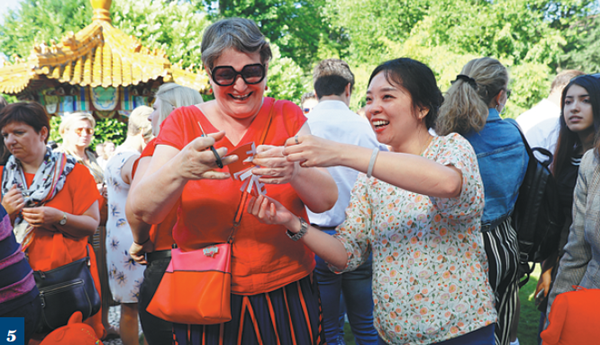
An open day is held at the Chinese embassy in Brussels, Belgium. [PAN GEPING/XINHUA]
China began establishing non-profit public institutions which the aim of promoting Chinese language and culture in other countries 15 years ago. The institutions were named the ancient Chinese thinker Confucius.
"Teaching the Chinese language and culture promotes global diversity and is an important channel for advancing common development that benefits China as well as the host countries," the Headquarters said.
The Confucius Institute has helped to promote cultural exchanges by advancing teaching methods and offering a wide range of educational and cultural activities.
For example, it offers Chinese-language education, training for Chinese-language teachers, con-ducts Chinese-language tests and issues teachers' certificates. It provides consultancy services on Chinese language and education, as well as hosting language and cultural exchange events between China and other countries.
Since its establishment, cultural activities held by Confucius Institutes worldwide have attracted more than 100 million people.
More than 10,000 Chinese directors of Confucius Institutes, teachers and volunteers are selected and sent each year to teach Chinese in various countries.
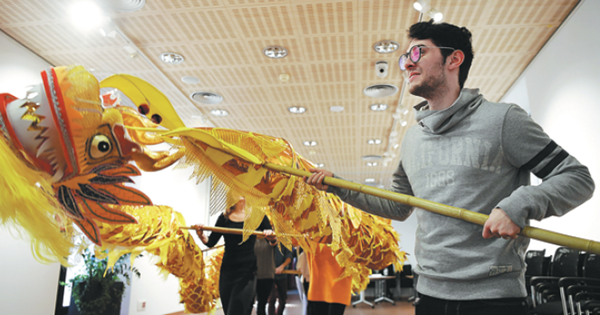
A dragon dance rehearsal is held in Madrid, Spain. [GUO QIUDA/XINHUA]
Language competition
Every year, more than 100,000 teenagers worldwide take part in the preliminary rounds and finals of the "Chinese Bridge" Language Competition. The institute also welcomes tens of thou-sands of education officials, school principals, teachers and students to China each year to experience Chinese culture.
Lee Hambee, 28, a student taking the Chinese translation and interpretation course at the Confucius Institute in Seoul, said she chose to study there because she believes she can receive more formal Chinese language training at the institute, as it is directly managed by the Confucius Institute Headquarters in China.
Lee lived in China for several years as her mother ran a business in the country, but did not formally start learning Chinese until she returned to the ROK. Now working in the entertainment industry, she hopes that mastering Chinese can lead to more career opportunities.
"CIS has helped me to find the right method to learn Chinese, and teachers here also give accurate guidelines for learning," Lee said.
Han Minhwa, Lee's teacher and head instructor at CIS, joined the institute in 2016. Han believes that practice is the key to learning a language. Every day, she gets up at 6 am and listens to Himalaya FM, one of the most popular podcast apps in China, before going to work.
"At first, I was just doing this to find teaching resources, but now it has become a habit," Han said.
CIS now has some 30 teachers, including part-timers. In addition to locals such as Han, about one-third of its instructors are Chinese sent by the Headquarters, who are also responsible for CIS training courses aimed at nurturing prospective Chinese-language teachers.
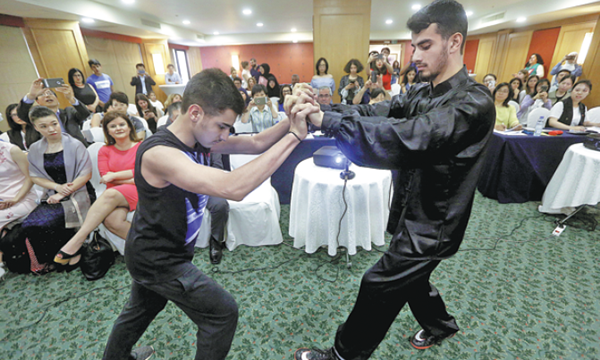
Two Lebanese men demonstrate their kung fu skills in Beirut. [PHOTO/XINHUA]
Volunteer groups
Yang Xue and Shen Feifei, both Chinese-language teachers, come from Northeast China. Living in an area geographically close to the ROK, they have been exposed to the global popularity of the country's pop culture.
In 2012, Yang was among the first group of volunteer teachers from China to join a national ex-change program between the two countries to mark the 20th anniversary of bilateral ties. Later, she taught successively at Saint-Joseph University's Confucius Institute in Lebanon and Shenyang Normal University in Liaoning province.
Yang returned to the ROK to teach in 2016.
Shen, a former volunteer for the program, believes that friendship between countries starts with individuals, and uses her spare time to deepen her understanding of the ROK.
"Before I first arrived in the country (in 2016), I didn't really know much about it … but I feel people here are very hospitable and polite," said Shen, who has passed the highest level of the Test of Proficiency in Korean.
After classes, Chinese and Korean teachers often sit together to discuss methods of instruction.
"While Chinese instructors have the natural advantage of being native speakers, Koreans also have their advantages as learners, because they are more familiar with issues that ROK students may face," Yang said. "By having meetings regularly, we use each other's advantages to improve the overall teaching quality at CIS.”
Encouraged by Confucius Institutes, more than 60 countries now include Chinese- language teaching in their national education systems, and over 170 nations have established Chinese-language courses or majors. Before 2004, there were fewer than 30 million Chinese learners worldwide. Now, the number exceeds 100 million.
Students learning Chinese in the ROK have a higher goal than merely passing the HSK.
Lee, the director, said CIS is in talks with several Chinese universities to launch an advanced Chinese-language training course by the end of this year for ROK high school students interested in studying in China.
"In the past, ROK students mainly studied majors such as Chinese language and literature, but now they are interested in every subject, from history and business management, to science and engineering," said Lee, who has worked in Chinese-language education for nearly 40 years.
With this year marking the 70th anniversary of the founding of the People's Republic of China and the 15th anniversary of CIS, Lee said the institute will organize a series of events, including an international symposium on Chinese-language education in October.
"Language is the prerequisite for communication," said Lee, who is also a professor of Chinese language and literature at Sungkyunkwan University in the ROK. "When people understand Chinese themselves, instead of knowing China through third-party sources such as media reports, they can experience Chinese culture and learn about the country directly."



 play
play